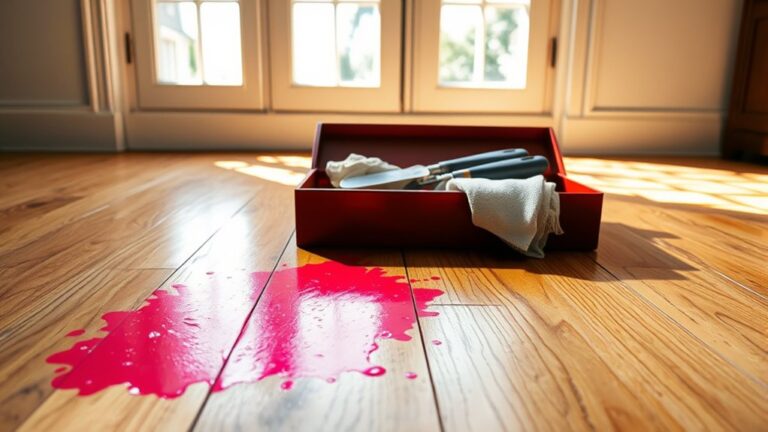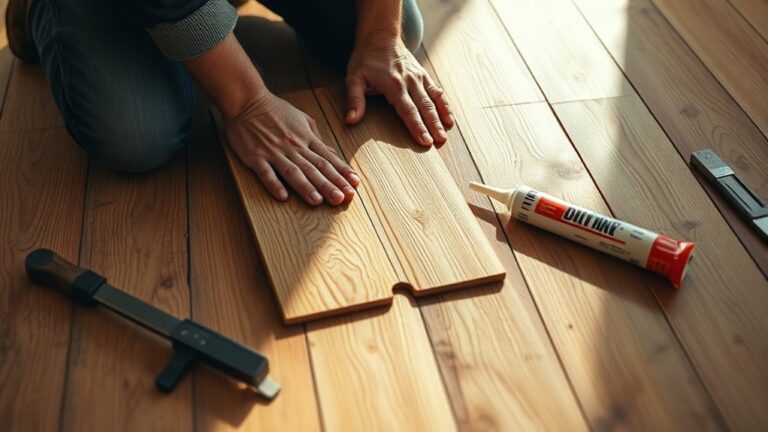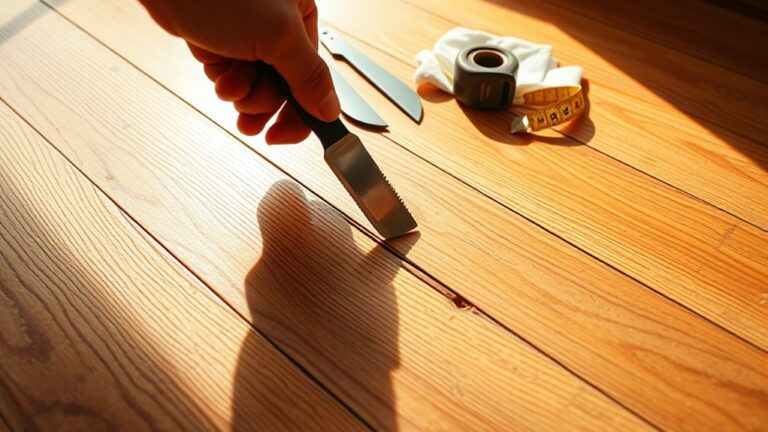To create a sensory-friendly space, consider flooring options that truly dampen sound. Thick carpets with dense padding are excellent at absorbing noise, while cork flooring offers an eco-friendly touch that's soft underfoot. Vinyl with foam backing not only looks stylish but also provides effective sound absorption. If you prefer a more durable solution, rubber sol excels in impact noise reduction. Don't forget to use acoustic underlayments and seal gaps around doors and windows for ideal performance. Each choice enhances your home's tranquility, making it a peaceful sanctuary. Explore more options to find the perfect fit for your needs.
Importance of Soundproofing
Understanding the importance of soundproofing can transform your living space into a sanctuary of peace. Imagine a home where the clattering of dishes or the hum of appliances fades into the background, allowing you to breathe, think, and relax. For those with sensory sensitivities, reducing sound is not just a luxury; it's a necessity. By soundproofing a room, you create an environment that nurtures comfort and well-being.
One of the most effective ways to achieve this tranquility is through sound-absorbing materials. Soft foam panels can be easily installed on walls, considerably diminishing high-frequency noises that can be overwhelming. Additionally, wall padding serves a dual purpose: it enhances your space's aesthetics while providing the necessary barrier against disruptive sounds.
When selecting the Best Flooring for your soundproofing needs, consider materials that naturally dampen noise. Carpets and rugs can act as excellent sound insulators, absorbing echoes and creating a cozy atmosphere. If you prefer hard surfaces, look for specialized soundproof underlayment that can be added beneath your flooring.
Types of Soundproof Flooring
When it comes to creating a peaceful retreat in your home, choosing the right flooring can make all the difference. You want a space that feels comfortable and serene, and soundproof flooring options can help you achieve that. Here are three top choices that provide excellent sound absorption:
- Carpet with Padding: Thick carpets not only offer a cozy feel underfoot but also excel at absorbing sound. They minimize noise transmission between rooms, making them perfect for sensory-friendly environments.
- Revêtement de sol en liège: This eco-friendly option is naturally sound-absorbent, providing a soft surface that dampens noise effectively. Cork flooring is gentle on the feet and helps create a calming atmosphere in any room.
- Vinyl Flooring with Foam Backing: If you're looking for a stylish yet practical solution, vinyl flooring with foam backing is designed to absorb sound while offering aesthetic appeal. It's often easier to maintain and can fit seamlessly into your home décor.
Other options to evaluate include Revêtement de sol en caoutchouc, known for its durability and impact absorption, and engineered hardwood with underlayment, which enhances sound absorption while delivering beauty. Each of these choices brings unique benefits to your sensory-friendly home, allowing you to enjoy your space without the disturbances of everyday noise. By selecting the right flooring, you can create a sanctuary that truly feels like your own.
Acoustic Solutions for Homes
Transforming your home into a serene oasis involves more than just choosing the right decor; it's about creating an environment where sound doesn't intrude on your peace. When it comes to acoustic solutions, selecting the right flooring can make a world of difference, especially if you're designing the best sensory room for your family. You'll want materials that effectively absorb sound and dampen impact, allowing your kids to play freely without the worry of noise disruption.
Consider thick carpets or cork flooring as your go-to options. Their dense materials excel at reducing noise levels, giving you that cozy, quiet atmosphere you crave. If you're leaning towards vinyl or laminate, don't forget to incorporate underlayments like foam or textile backing. These additions are easy to install and can greatly enhance sound absorption, transforming your space into a haven of tranquility.
Also, pay attention to your installation methods. Sealing gaps and using acoustic adhesives can remarkably improve the overall performance of your chosen flooring. With a high Impact Insulation Class (IIC) rating of 65 or above, you'll guarantee that your flooring absorbs impact effectively, making your home an ideal spot for relaxation and play.
Budget-Friendly Soundproofing Options
Creating a quieter home doesn't have to break the bank; several budget-friendly soundproofing options can make a notable impact. With just a few strategic changes, you can minimize noise infiltration and create a more peaceful environment. Here are three effective options:
- Thick Carpets and Dense Underlays: Investing in thick carpets with dense underlays can muffle sounds remarkably. Not only do they feel great underfoot, but they also absorb sound waves, making your space quieter and more comfortable.
- Panneaux en mousse acoustique: These affordable panels can be applied to walls or ceilings, absorbing mid- and high-frequency sounds. You can find them at low prices online or in stores, and they're easy to install. Just peel and stick!
- DIY Soundproofing: Get creative with DIY options like hanging heavy blankets or quilts on walls. This quick fix can dampen sound without needing professional materials. Additionally, consider weatherstripping your doors and windows to seal gaps, further reducing noise infiltration.
By incorporating solid wooden doors instead of hollow-core ones, you can also enhance sound insulation in your home. Finally, if you need something portable, consider lightweight soundproof mats that you can move around as needed.
With these cost-effective solutions, you can embrace the freedom of a quieter, more sensory-friendly environment without overspending.
Enhancing Acoustic Comfort
Enhancing acoustic comfort in your home can make a world of difference in how you experience your living space. Imagine walking on soundproof flooring that not only feels good underfoot but also keeps unwanted noise at bay. Options like laminate with attached pads are fantastic for reducing echo while providing that cozy feel you crave.
Consider materials like cork and rubber, renowned for their impressive sound-absorbing properties. These flooring choices aren't just stylish; they create an oasis of calm, ideal for sensory-friendly homes. When selecting your flooring, pay attention to the Impact Insulation Class (IIC) rating. Look for options rated IIC 65 or higher to guarantee peak sound impact reduction, allowing you to maintain a peaceful environment.
To further enhance your acoustic comfort, think about incorporating a foam underlayment beneath your vinyl flooring. This additional layer can greatly improve sound absorption, transforming your space into a serene retreat. And don't underestimate the importance of proper installation techniques; using flexible acoustic adhesives can maximize those sound-absorbing benefits and create an uninterrupted barrier against noise.
Questions fréquemment posées
How to Soundproof a Room for Autism?
To soundproof a room for autism, you'll want to focus on creating calming environments. Start by adding acoustic panels to walls for effective sound absorption. Consider flooring materials like thick carpets with dense padding, enhancing noise reduction. Don't forget about weatherstripping and door sweeps to block outside noise. Heavy curtains can also help, making your sensory spaces quieter and more comfortable, ultimately fostering a peaceful atmosphere for relaxation and focus.
What Is the Best Flooring for Autism?
Did you know that up to 70% of autistic individuals are sensitive to sound? Choosing the best flooring for autism involves selecting autism-friendly materials that offer sensory-friendly designs and texture considerations. Look for options with safety features, like non-slip surfaces. Luxury vinyl or cork can enhance both flooring aesthetics and comfort. Don't forget maintenance tips, like regular cleaning, to keep your space inviting and functional. You're creating a peaceful haven, and every detail matters!
What Type of Flooring Is Best for Soundproofing?
When you're looking for the best flooring for soundproofing, consider options like cork flooring for its natural sound absorption, or rubber flooring, which offers durability and shock absorption. Carpet tiles can also help, especially with acoustic underlayment underneath to further reduce noise. Don't overlook vinyl planks paired with sound absorbing mats for a stylish yet effective solution. Each choice you make can create a quieter, more peaceful environment in your home.
Which Flooring Makes Least Noise?
When you're wondering which flooring makes the least noise, consider cork flooring or carpet tiles; both excel at reducing sound. Rubber mats are another great choice, absorbing impacts and minimizing noise. If you're exploring laminate options, pairing them with acoustic underlay can greatly enhance sound dampening. Bamboo flooring, while stylish, also provides decent noise reduction, making it a practical choice for quieter spaces. Embrace the freedom of living in a peaceful environment!




